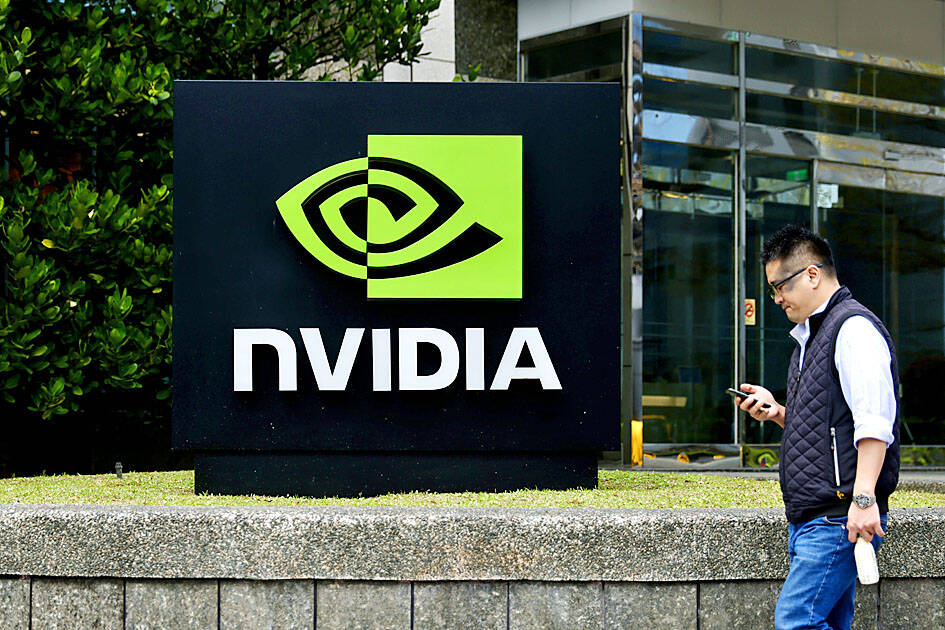Nvidia Corp faces a significant revenue threat due to the latest US export restrictions on artificial intelligence (AI) chips, designed to limit the global distribution of these coveted processors, analysts and investors said on Monday.
The regulations, among the strongest yet from US President Joe Biden’s administration, limit AI chip exports to most countries except for a select group of close US allies.
They also maintain a block on exports to some countries, including China, as the US tries to close regulatory loopholes and prevent Beijing from acquiring advanced chips that could bolster its military capabilities.

Photo: EPA-EFE
Surging demand for AI chips has catapulted Nvidia into the ranks of the world’s most valuable firms, with a market value exceeding US$3 trillion. However, the new restrictions might complicate its ability to deliver the robust revenue growth that investors expect.
“These rules will significantly limit [Nvidia’s] market since as much as half its chips currently end up in countries that will be off-limits once the rules are applied,” DA Davidson & Co analyst Gil Luria said.
Company filings show that Nvidia gets about 56 percent of its revenue from customers outside the US, with China making up about 17 percent of sales.
“By limiting access to large quantities of advanced processors, the US is effectively showing the world who’s the boss. However, in doing so, it also threatens to crimp the earnings potential for many American firms such as Nvidia,” AJ Bell PLC investment analyst Dan Coatsworth said.
Meanwhile, Nvidia cofounder and chief executive officer Jensen Huang (黃仁勳) is embarking on a trip to China this week, visiting major cities at a time Beijing is investigating his company’s domestic presence and Washington is slapping new curbs on the sale of its AI chips abroad.
Huang is due to arrive in Shenzhen for employees’ annual Lunar New Year celebrations today, days before US president-elect Donald Trump gets sworn in for a second term on Monday next week, people familiar with the matter said.
Huang also plans to visit Shanghai and Beijing, and would fly to Taipei later this week, they said.
Additional reporting by Bloomberg

Intel Corp chief executive officer Lip-Bu Tan (陳立武) is expected to meet with Taiwanese suppliers next month in conjunction with the opening of the Computex Taipei trade show, supply chain sources said on Monday. The visit, the first for Tan to Taiwan since assuming his new post last month, would be aimed at enhancing Intel’s ties with suppliers in Taiwan as he attempts to help turn around the struggling US chipmaker, the sources said. Tan is to hold a banquet to celebrate Intel’s 40-year presence in Taiwan before Computex opens on May 20 and invite dozens of Taiwanese suppliers to exchange views

Application-specific integrated circuit designer Faraday Technology Corp (智原) yesterday said that although revenue this quarter would decline 30 percent from last quarter, it retained its full-year forecast of revenue growth of 100 percent. The company attributed the quarterly drop to a slowdown in customers’ production of chips using Faraday’s advanced packaging technology. The company is still confident about its revenue growth this year, given its strong “design-win” — or the projects it won to help customers design their chips, Faraday president Steve Wang (王國雍) told an online earnings conference. “The design-win this year is better than we expected. We believe we will win

Quanta Computer Inc (廣達) chairman Barry Lam (林百里) is expected to share his views about the artificial intelligence (AI) industry’s prospects during his speech at the company’s 37th anniversary ceremony, as AI servers have become a new growth engine for the equipment manufacturing service provider. Lam’s speech is much anticipated, as Quanta has risen as one of the world’s major AI server suppliers. The company reported a 30 percent year-on-year growth in consolidated revenue to NT$1.41 trillion (US$43.35 billion) last year, thanks to fast-growing demand for servers, especially those with AI capabilities. The company told investors in November last year that

Power supply and electronic components maker Delta Electronics Inc (台達電) yesterday said it plans to ship its new 1 megawatt charging systems for electric trucks and buses in the first half of next year at the earliest. The new charging piles, which deliver up to 1 megawatt of charging power, are designed for heavy-duty electric vehicles, and support a maximum current of 1,500 amperes and output of 1,250 volts, Delta said in a news release. “If everything goes smoothly, we could begin shipping those new charging systems as early as in the first half of next year,” a company official said. The new